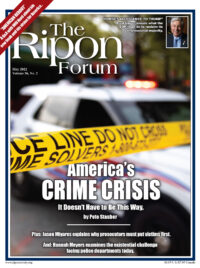
Did you know there’s only one right that is mentioned both in the body of the unamended Constitution and the Bill of Rights? And not only does the Bill of Rights spend more words on this subject than any other, it was also one of the few things the Federalists and Anti-Federalists agreed upon as being indispensable to American government. It’s the right to a criminal jury trial, and it has been almost completely purged from our system by the ad hoc, extra-constitutional, and often extraordinarily coercive practice we call “plea bargaining.”
Unknown at the Founding and nowhere mentioned in the text of the Constitution, plea bargaining began creeping into our criminal justice system in the late nineteenth century and received a boost when the Supreme Court upheld it in a 1970 case called Brady v. United States and insulated it from any meaningful judicial scrutiny. It has since expanded to the point where Justice Kennedy observed in a 2012 case that plea bargaining “is not some adjunct to the criminal justice system; it is the criminal justice system.”
According to the U.S. Sentencing Commission’s 2021 Sourcebook, 98.3 percent of federal criminal convictions came from guilty pleas, and only two percent of cases went to trial.
The data bear this out. According to the U.S. Sentencing Commission’s 2021 Sourcebook, 98.3 percent of federal criminal convictions came from guilty pleas, and only two percent of cases went to trial. Figures from the states are less precise, but similar. What this means is that, contrary to the Founders’ decision to put citizen participation at the very heart of the administration of criminal justice, ordinary people have almost no personal involvement in deciding who gets charged, convicted, and incarcerated in America; instead, those decisions are made by prosecutors with a strong incentive to maximize efficiency and convictions rates. The resulting system of plea-driven mass adjudication is profoundly pathological and fundamentally illiberal.
The most significant problem with a plea-based system is the use of coercion to obtain guilty pleas. Judges and prosecutors assure us that inducements to plead guilty never cross the line from permissibly motivating to palpably coercive, but the evidence is clearly to the contrary. Thus, of the three thousand people on the National Registry of Exonerations, more than 15 percent falsely pleaded guilty to crimes they did not commit—a figure that surely represents just the tip of the iceberg given how resistant the system is to post-convictions claims of innocence. As Federal District Judge Jed Rakoff documents in chilling detail, there is every reason to believe innocent people in our system regularly plead guilty to crimes they did not commit.
The most significant problem with a plea-based system is the use of coercion to obtain guilty pleas.
The second problem with plea bargaining is that it favors quantity over quality. This is reflected in the current record-low rates of arrest for serious crimes such as murder, rape, and robbery. Indeed, the arrest (or “clearance”) rate for homicide today is less than 50 percent, while fewer than 30 percent of rapes and robberies are ever solved. When prosecutors know that most of their cases will result in guilty pleas they can afford to pursue marginal transgressions that would not merit the expense and inconvenience of a full-blown jury trial. America is by far the world’s leading jailer, with an incarceration rate five or six times that of other liberal democracies such as Canada, Australia, and England. A question that should haunt all of us is whether we would pursue that many convictions if we had to pay the full constitutional cost—including a jury trial—for every one of them. The oft-heard refrain that “the system would grind to a halt” without plea bargaining strongly suggests that the answer is no.
Finally, the practice of inducing people to condemn themselves is an inherently squalid business that has been embraced and abused by the worst regimes throughout history. This is manifested in various plea-bargaining practices, including the notorious “trial penalty,” which is the differential between the sentence offered to the defendant if he pleads guilty versus the sentence he is threatened with if he goes to trial and loses—a differential that routinely exceeds three hundred percent in our system and that the Supreme Court has effectively held can be limitless. Incredibly, courts have also approved the practice of threatening to indict (or refrain from indicting) a defendant’s family members just to exert plea leverage. Short of physical torture, a more coercive tactic is difficult to imagine.
The Founders were no strangers to tyranny, and they would recognize it instantly in a system that depends on people to confess their guilt instead of proving it beyond a reasonable doubt to the satisfaction of a unanimous jury. Citizen participation is indispensable to the administration of criminal justice. The Framers knew this, and they wrote it into the Constitution with unmistakable clarity. Or so they might have thought.
Clark Neily is Senior Vice President for Legal Studies at the Cato Institute.




